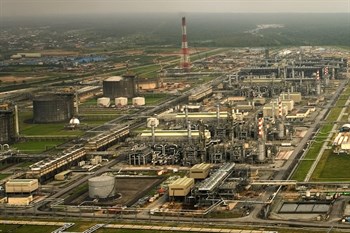Asia prices down on soft demand, further downside seen limited
(Reuters) - Asian spot LNG prices were down this week on softer Spring demand but further downside is limited as Asian buyers are expected to start to return to the market.

The average LNG price for June delivery into north-east Asia was estimated at $25.40 MMbtu, down $7.60, or around 23%, from the previous week, industry sources said.
"The current LNG market trend is flat to bearish as we are now firmly into the shoulder season (where demand for gas is lower) and a similar downward pressure is being felt on the TTF," said Kaushal Ramesh, senior LNG and gas analyst at Rystad Energy.
Shoulder season is the months after winter and ahead of summer - March, April and early May - when demand for gas is usually lower.
"Prices are now at a level where price-sensitive South Asia has returned to the market, as observed from a string of cargoes purchased over the last couple of weeks at sub-$30/MMbtu prices. This trend is set to continue in the very near term, as this region has been on the sidelines for several months," he added.
China's overall LNG imports last month fell 17% yoy to 4.63 MMtons, the lowest in two years.
Right now, China's strict COVID-19 lockdown has lowered demand but Asian markets could experience a hot summer with above than average temperatures, translating into high power demand and accordingly higher demand for LNG.
Refinitiv Eikon data show warmer and drier weather in China is ecxpected over the next two weeks, while temperatures will be 1-3 degrees Celsius above normal in Korea and Japan.
In Europe, LNG deliveries have remained firm in April and the continent is expected to surpass the record level observed in January, said Nnenna Amobi, senior LNG analyst at Refinitiv.
Russian gas pipeline supplies to Europe have so far remained stable, but market players are concerned over possible disruptions of Russian gas as a deadline for rouble payments nears.
On Monday, Kremlin spokesman Dmitry Peskov said there was still time for so-called "unfriendly" countries to switch to payments for gas in roubles that are due in May.
"A scenario of an outright disruption in Russian pipeline flows may push the TTF back over $100/MMbtu so that upside risk still looms over the market like a dark cloud," Ramesh said.
(Reporting by Marwa Rashad; Editing by Nina Chestney)

- RWE strengthens partnerships with ADNOC and Masdar to enhance energy security in Germany and Europe
- TotalEnergies and Mozambique announce the full restart of the $20-B Mozambique LNG project
- Venture Global wins LNG arbitration case brought by Spain's Repsol
- KBR awarded FEED for Coastal Bend LNG project
- Norway pipeline gas export down 2.3% in 2025, seen steady this year



Comments